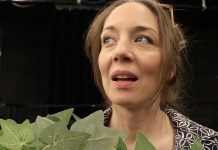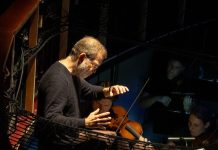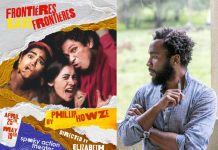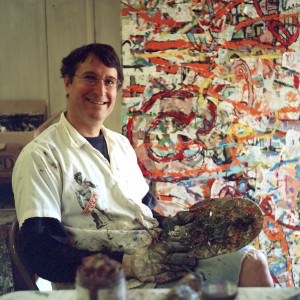
DCMetroTheaterArts caught up with Playwright Tom Block over coffee, in the small, sun-filled writing studio where he creates his written works. As he sat overlooking the rural expanse of his 15/100ths of an acre in downtown Silver Spring, he took a few moments to answer our questions about the world premier of his play, Butterfly, which is being produced by Wanderlust Theater Lab at the Takoma Park Community Center Theater, a 150-seat proscenium stage in the heart of Takoma Park, MD, not far from, Washington D.C. Performances begin tonight.
Joel: Tell us a little bit about your playwriting. You seem to have come to theater a bit later than some, in the middle of your artistic career instead of at the beginning of it.
Tom: Thanks – I’m so glad you asked. Butterfly grows out of my own philosophical and artistic search over the past couple decades. Although I have been primarily a visual artist, I have always been writing. It was only recently, however, that I began to have success in that arena. In just the past couple of years, I have published two books (Shalom/Salaam: A Story of a Mystical Fraternity, Fons Vitae, 2010 and A Fatal Addiction: War in the Name of Love, Algora, 2012) and had two plays produced (White Noise, my first, premiered in DC last June and will be produced at Theater for the New City in New York, this summer).
While there are obviously downsides to finding literary success so late, one bonus is that I have a very highly developed and nuanced philosophical system underpinning all of my work. I have been reading mystical and philosophical tracts for more than 20 years, and all of this information and my Sufi-inspired worldview deeply influence my theater.
Additionally, I found that it in theater, I can bring all of my interests – painting, mysticism, philosophy, even music and dance – together in one place. In my other media, I have to stay within the lines. For instance, in the visual art world, they don’t want too much thinking! It ruins the worth of the object. Just shut up and paint something we can place above a sofa.
And in the world of academia, definitely no painting or un-footnoted theorizing.
In theater, however, I can throw everything I have onstage and it only increases the tension, meaning and theatricality of the play.
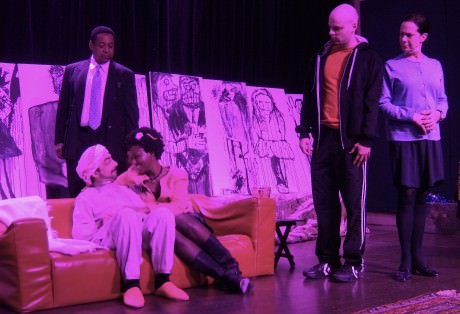
Tom, can you tell us a bit about the play? It’s genesis and meaning?
Butterfly is the second of a trilogy of plays exploring fundamental human issues like prophecy, tribalism (racism), sexuality, faith, love, hate, etc. The three plays are organically linked by themes – they do not involve the same characters or a beads-on-the-string time progression.
Butterfly deals, most importantly, with issues of prophecy. What does prophecy look like in our era? The medieval and scriptural prophets that we hold dear in all Abrahamic faiths would almost certainly be ignored and/or end up in a mental hospital today. On a back ward, no less.
How does one cut through the noise in a society with a 140-character attention span to discuss the most important spiritual issues facing us? I deal with the question, but I don’t answer it. My goal is to raise issues – about faith and prophecy, about sanity and insanity, about what makes someone important in our culture, about love. Not to answer them. I want to leave the audience buzzing, and arguing with each other over what exactly I meant.
There are two signature lines from the play that stand out as central to its meaning. The first is spoken by the father (a jazz musician who has been interred in a mental hospital by Todd’s mother) of our prophet/hero/martyr. A young woman has happened onto the scene and is captivated by it, but can’t understand exactly what is going on around her. Finally she says: “This is all so painful. Doesn’t God want us to be happy?” To which the wise old jazz musician, invisible to all onstage except this newcomer, replies: “No.”
The other signature moment is when the acolyte Jan is asking for some kind of surcease from the pain – someone to help “heal” him. But the prophet can only offer this line: “My job is to open wounds, not heal them.” His proposition is that pain is fundamental to human consciousness Without psychic pain, there might not even be a conception of God in the human realm.
When you enter my play, you are entering a parallel universe. That which is normal no longer exists. That which is surprising, odd or completely improbably becomes the norm. The ideas swirl around this world of metaphor. Backed by the original musical score, created by dynamic cellist Desiree Miller, and my paintings, the play removes the viewer from the world of the mundane and into a world where only the most vital questions of human existence are relevant.
The opposite, one might say, of our day-to-day life.
Is there anything else we should know about the production?
Yes, there is. I am not trained in theater, so in my playwriting, I am a bit like a head without a body. I can present the ideas, but I have no idea how to translate them onto the time and place environs of the stage.
That’s why my relationship with my director, Roselie Vasquez-Yetter, and the lead of the play, who is also a theater mentor for me, Michael Mack, is so important. In stark terms, they “get” it, whatever that means. They look beyond the need for linear thinking, specific character development and the kind of normal plot arc of regular theater to the nuance, questioning and impressionism of my work.
Most importantly, they are able to translate these seemingly confusing messages into a coherent whole – one that allows the emotion, metaphor and spiritual questioning underpinning the work to shine through.
Without partners such as this, and the rest of the amazing cast (all of whom have had to take a leap of faith to premier this challenging work), this work might not shine as brightly.
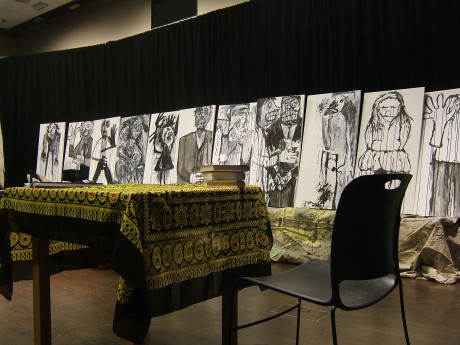
And finally, my plays are never boring. Challenging, head-scratch inducing and non-linear, yes. But I would wager that very few people will be looking at their watches, wondering when the thing will be over.
Butterfly plays from February 15, 2013 – February 23, 2013, at Takoma Park Community Center Theater – 7500 Maple Avenue, in Takoma Park, MD. For tickets, purchase them online.
LINKS
Part One: Wanderlust Theater Lab: An Interview with Founder Roselie Vasquez-Yetter by Tom Block.
Part Two: Wanderlust Theater Lab: An Interview with Founder Roselie Vasquez-Yetter and Playwright Tom Block.
Part Three: Wanderlust Theater Lab: Meet the Cast of ‘Butterfly’ by Tom Block and Roselie Vasquez-Yetter.


